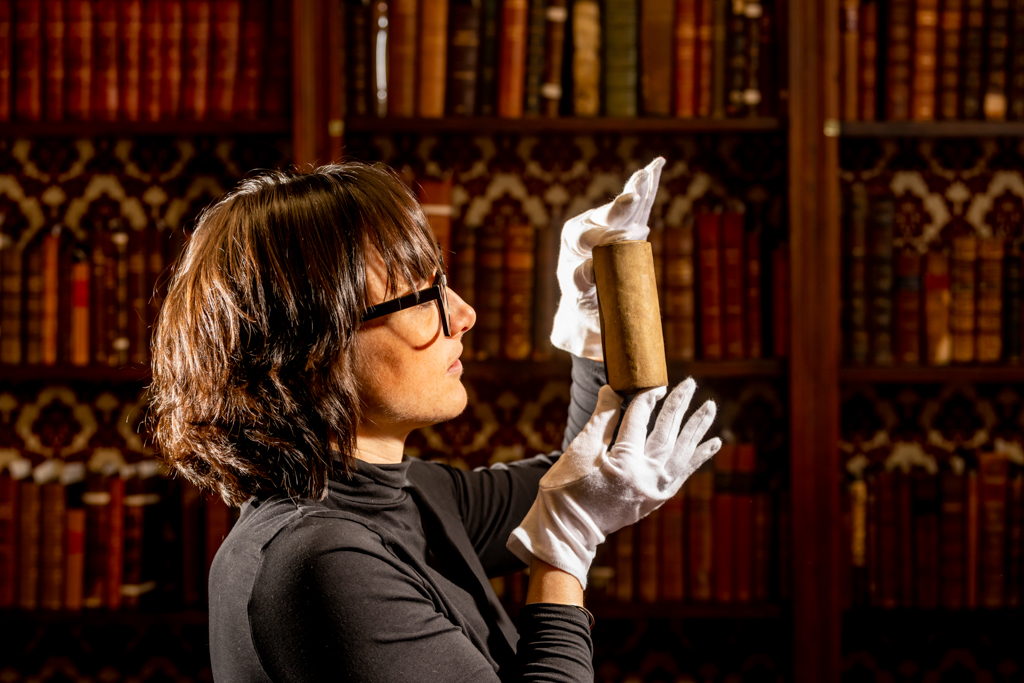A Remarkable Find in Religious History
A rare medieval illuminated scroll, known as an Arma Christi, has been discovered in the archives of York’s Bar Convent, marking one of the most significant historical finds in recent years. This extraordinary scroll features the prayer poem O Vernicle and is thought to be one of the finest examples ever found. Unlike previous discoveries, this particular scroll contains response texts after each verse, suggesting a different use than originally believed.
A Glimpse into the Past
Arma Christi scrolls were created in the 14th and 15th centuries as devotional items, often depicting symbols of Christ’s Passion alongside sacred prayers. Only ten known copies have survived, each handmade by skilled craftsmen. Given the turbulent history of Catholicism in England, many medieval religious artefacts were lost, particularly during the Reformation in the 1540s and subsequent suppression of Catholic worship under Elizabeth I. The newly uncovered scroll, believed to date back to around 1475, may be one of the last of its kind ever produced.
Unlike previously known versions, which were thought to be for private devotion, this scroll includes responses written in red, suggesting communal worship rather than individual prayer. This new detail challenges traditional assumptions about how these sacred items were used and offers fresh insight into medieval religious practices.
The Discovery
The scroll was unearthed by Dr Hannah Thomas, Special Collections Manager at Bar Convent, while cataloguing the institution’s extensive archives. The scroll was initially stored inside an unremarkable box, measuring just six inches wide when rolled. However, when fully unfurled, the detailed hand-drawn illustrations and medieval calligraphy revealed an exceptional artistic and religious treasure.
“This is a beautifully illuminated work, featuring hand-drawn figures and intricate text,” explains Dr Thomas. “What makes it truly unique is the inclusion of response texts, which suggest it may have been used by groups or families praying together rather than just by individuals.”
Preserving England’s Catholic Heritage
The Bar Convent, founded in 1686, is England’s oldest surviving Catholic convent. During times of persecution, precious religious objects and manuscripts were entrusted to the sisters for safekeeping. It is unclear when or how this Arma Christi scroll came into the convent’s possession, as records of its transfer do not exist. However, its presence within the archives highlights the convent’s longstanding role in preserving Catholic heritage in England.
For centuries, the convent has safeguarded rare religious items, many of which are displayed in the Bar Convent Living Heritage Centre. However, full cataloguing of the collection has only recently begun, making this discovery a groundbreaking moment in religious and historical scholarship.
Public Exhibition and Special Mass
Recognising its historical and religious significance, the newly discovered Arma Christi scroll will become the centrepiece of a major exhibition at the Bar Convent Living Heritage Centre, opening on Saturday, 5 April 2025. “We understand the excitement surrounding this find,” says Sister Ann Stafford, Superior of the Bar Convent. “But having been hidden for over 500 years, we believe the world can wait a few more weeks to see it unveiled properly.”
In addition to the exhibition, the scroll’s prayers and devotional texts will be used in a special Mass held in the convent’s historic chapel. The service will be attended by a representative from the Archbishop of York, along with local dignitaries and faith leaders. Plans are also in place to livestream the event, allowing people from across the world to take part in this historic occasion.
A Treasure Reclaimed
The discovery of this remarkable medieval artefact challenges previous scholarly assumptions and brings to light a new perspective on how faith was practised in the late Middle Ages. With its impending public unveiling, the scroll is set to offer scholars, historians, and the faithful an unprecedented glimpse into England’s rich religious history.
